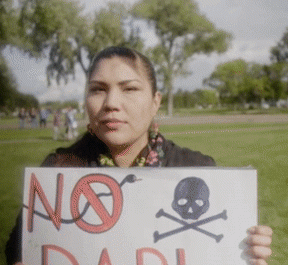During the month of November, we will be profiling some amazing Indigenous activists and trailblazers. To kick us off, here are a few incredible women who have led (and are continuing to lead) on myriad issues surrounding both Indigenous peoples’ and women’s rights.
Leanne Betasamosake Simpson
Leanne Betasamosake Simpson is an award-winning scholar, writer, artist, and poet of Michi Saagiig Nishanaabeg heritage. Islands of Decolonial Love, Simpson’s first publishing and one of her most highly celebrated works, is a collection of short stories and poems with its own set of corresponding spoken word and musical pieces. Other works by Simpson, such as Dancing on Our Turtle’s Back and The Gift Is in the Making, are commonly taught at the University level in both the U.S. and Canada. After receiving a PhD from the University of Manitoba, Simpson became a faculty member at the Dechinta Centre for Research & Learning in Denendeh and a Distinguished Visiting Scholar in the Faculty of Arts at Ryerson University in Toronto, Canada. 
Simpson was influential in the creation of the ongoing protest movement Idle No More, founded in 2012. Idle No More is a grassroots movement to promote the rights of aboriginal peoples in Canada that comprise the First Nations, Métis and Inuit peoples, created in reaction to the legislative abuses of Indigenous treaty rights. Simpson continues to take part in resistance toward colonialism in Indigenous communities by pushing to aid in the protection of lands, cultures, nationhoods, and languages through her her studies, writing, and active participation in Idle No More.
Ladonna Brave Bull Allard
Ladonna Brave Bull Allard is an activist, storyteller, tribal historian, and member of the Standing Rock Sioux Tribe. Allard is the Standing Rock Tribal Tourism Coordinator for the Standing Rock Sioux Tribe and is the Marketing Manager for the Alliance of Tribal Tourism Advocates.
After studying history at the University of North Dakota, Allard conducted research and compiled documents to ensure the preservation of information about her tribe’s history. She has been trained in historical preservation and is a national certified interpretive guide for Indigenous history. Her current work as Tourist Coordinator and Marketing Manager enables her to provide visitors with the rich history of Standing Rock and the Lakota Tribe.
As a member of the Standing Rock community, Allard was a leading activist in the 2016 fight against the Dakota Access Pipeline. Allard’s land was the site of Sacred Stone, the first camp of resistance against the Dakota Access Pipeline, and Allard was one of the first to set up camp. Allard remained on the campground throughout the long, bloody, and freezing battle against the pipeline. She witnessed her own daughter’s arrest and brutalization due to her part in the protest, and endured physical trauma herself from teargas, attack dogs, and water cannons. Due to her advocacy, the #noDAPL movement grew to be one of the most widely-supported Indigenous rights movements in the 21st century.
Sarah Deer
Sarah Deer is a Native American professor, lawyer, and advocate for survivors of sexual assault and domestic violence in Native American communities. Born and raised in Muscogee Creek Nation, Deer has had an influential voice on the topic of women’s rights in the face of violence within Native American communities, especially her own. As a lawyer, she was credited for her prominent role in the 2013 re-authorization of the Violence Against Women Act, and she fought for an incorporation of tribal jurisdiction when prosecuting non-Native perpetrators for sexual and domestic abuse.
Deer is currently a professor at the University of Kansas, where she teaches international and interdisciplinary studies covering a variety of subjects. Deer published a collection of essays entitled The Beginning and End of Rape: Confronting Sexual Violence in Native America, which highlights the history and intersections of abuse towards Native communities, specifically Native women. In this piece, Deer discusses the obstacles that many survivors face when trying to pursue legal recourse due to the lack of tribal legal systems.

